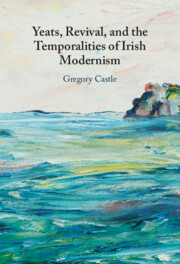Book contents
- Yeats, Revival, and the Temporalities of Irish Modernism
- Yeats, Revival, and the Temporalities of Irish Modernism
- Copyright page
- Dedication
- Contents
- Figures
- Acknowledgments
- Note on Citations
- Abbreviations
- Introduction Time, Recognition, and the Worlds of Yeats’s Work
- Chapter 1 The Irish Revival and Yeats’s Literary Nationalism
- Chapter 2 “A Dream-Heavy Land”
- Chapter 3 “O When Will It Suffice?”
- Chapter 4 “The Age-Long Memoried Self”
- Chapter 5 “I Make the Truth”
- Chapter 6 “They Had Changed Their Throats”
- Conclusion
- Works Cited
- Index
Conclusion
Yeats’s “A General Introduction for My Work”
Published online by Cambridge University Press: 11 April 2024
- Yeats, Revival, and the Temporalities of Irish Modernism
- Yeats, Revival, and the Temporalities of Irish Modernism
- Copyright page
- Dedication
- Contents
- Figures
- Acknowledgments
- Note on Citations
- Abbreviations
- Introduction Time, Recognition, and the Worlds of Yeats’s Work
- Chapter 1 The Irish Revival and Yeats’s Literary Nationalism
- Chapter 2 “A Dream-Heavy Land”
- Chapter 3 “O When Will It Suffice?”
- Chapter 4 “The Age-Long Memoried Self”
- Chapter 5 “I Make the Truth”
- Chapter 6 “They Had Changed Their Throats”
- Conclusion
- Works Cited
- Index
Summary
In the conclusion, I reflect on Yeats’s “A General Introduction for my Work” of 1937. It is an unusual text, meant originally to introduce his collected works but left unpublished until the posthumous Essay and Introductions (1961). It leads a negative dialectical existence, severed from its original place and left to perform a fugitive function with respect to the poet’s own oeuvre. For this reason, perhaps, it serves less as an introduction than as an epilogue, a summation of certain key ideas about revivalism, his poetry, and his occult works. Yeats sees from the vantage point of his later years that his literary style – as well as the worlds it creates in his work – could only have emerged from the bedrock of the self. Two years after Yeats composed his “General Introduction,” W. H. Auden, in his elegy “In Memory of W. B. Yeats,” wrote that after his death, the poet “is scattered among a hundred cities,” part of a vital future he had to leave behind: “The words of a dead man /Are modified in the guts of the living.” It is just this sort of continuance and renewal that characterize Yeats’s revivalism and his hope for coming times.
- Type
- Chapter
- Information
- Yeats, Revival, and the Temporalities of Irish Modernism , pp. 233 - 240Publisher: Cambridge University PressPrint publication year: 2024

